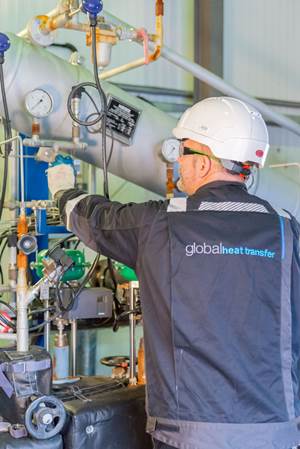Thrifty California Processor Dries PET with 'Waste' Heat
Processor strategies: FDS Manufacturing Co.
Southern California can be a challenging environment for manufacturers, not least because of concerns about the cost and availability of electrical power.
Southern California can be a challenging environment for manufacturers, not least because of concerns about the cost and availability of electrical power. It was a series of brownouts around 10 years ago that got FDS Manufacturing Co. in Pomona thinking about backup diesel generators. But those units can be run only for 500 hr per year, owing to air-emissions rules. It was when FDS installed a 6-in., 4000-lb/hr PET sheet extrusion line with associated crystallizer and dryer a few years ago that the firm began looking
into electrical cogeneration with gas turbines to control energy costs.
“There’s 800 amps for that extruder alone,” says Kevin Stevenson, v.p. of engineering. “But the light bulb really lit up when I realized that the thermal output of a gas turbine—separate from the electrical output—was a perfect match for the Btu requirements of a 4000-lb/hr PET crystallizer or dryer.” That led him to try something that, as far as he knows, has never been done before.
BREAKING NEW GROUND
FDS (fdsmfg.com) is a family-owned firm that was started by Stevenson’s grandfather in 1950 and is run today by his father. It has grown to about $20 million in annual sales to local agricultural markets, producing thermoformed PET fruit trays and clamshell berry boxes, as well as injection molded PP berry baskets and corrugated cardboard rolls, sheets, and pads. It employs around 200 people and operates one extrusion line, six thermoformers, and 12 molding presses of 50 to 300 tons in 250,000 ft² of manufacturing and warehouse space in Pomona, plus another facility in Fowler, Calif.
When he began thinking of gas-turbine power, Stevenson got help from Regatta Solutions in San Juan Capistrano (regattait.com), which is the exclusive distributor in Southern California for Capstone
Turbine Corp. (capstoneturbine.com) in Chatsworth, Calif. Steve Acevedo, Regatta’s president and CEO, says a number of local manufacturers have been taking advantage of the low price of clean-burning natural gas to cut electrical costs and ensure reliable power—an issue that has been highlighted by an
indefinite shutdown of the San Onofre nuclear power generating plant. Despite the high cost of electricity in Southern California, Acevedo recommends that a gas turbine installation be sized for the thermal needs—heating or cooling—of the plant. “There’s your economic justification,” says Acevedo. “The electrical power cogeneration is the icing on the cake.”
For FDS, that “icing” provides about 30% of the Pomona plant’s electrical needs, saving about $30,000 a month. “Average electrical cost here is 16¢/kWh, and we’re cogenerating for 10¢/kWh,” Stevenson says.
In 2008, FDS installed six Capstone turbines of 65-kW capacity each (which cost around $150,000 apiece at today’s prices). The waste heat from four of those turbines passes through an air/water heat exchanger to provide cold process water at 42 to 47 F by means of a salt-solution absorption cooling system. Waste heat from the other two turbines is sent through an air/air heat exchanger to provide all the hot air for an XTLR-4000 crystallizer and 450-ft3 DHD-120 drying hopper, both from Universal Dynamics, Inc., Woodbridge, Va. (unadyn.com). The conversion was achieved with UnaDyn’s assistance. FDS left the original gas burners on this equipment, in case they were ever needed. But they have been running on waste heat 24/7 for three years without a hitch. Stevenson thinks this has never been done before, and UnaDyn sources agree.
Related Content
Chiller Lines Updated to EPA-Approved Refrigerants
Thermal Care’s chillers now utilize EPA-approved low Global Warming Potential (GWP) R‐454B and R‐513A refrigerants.
Read MoreFree Cooling Chiller System Launches
Delta T Systems enters the free cooling space with a line that uses ambient air to cool the process fluid.
Read MorePiovanGroup Rebrands, with Mostly Minor Name Changes
For the most part, subsidiary company names will remain, with slight modifications meant to enhance the Group’s identity.
Read MoreFollow These Best Practices When Working With Heat Transfer Fluids
Effectively choosing, operating and maintaining thermal fluid can positively impact productivity in plastics processing.
Read MoreRead Next
People 4.0 – How to Get Buy-In from Your Staff for Industry 4.0 Systems
Implementing a production monitoring system as the foundation of a ‘smart factory’ is about integrating people with new technology as much as it is about integrating machines and computers. Here are tips from a company that has gone through the process.
Read MoreSee Recyclers Close the Loop on Trade Show Production Scrap at NPE2024
A collaboration between show organizer PLASTICS, recycler CPR and size reduction experts WEIMA and Conair recovered and recycled all production scrap at NPE2024.
Read More



















